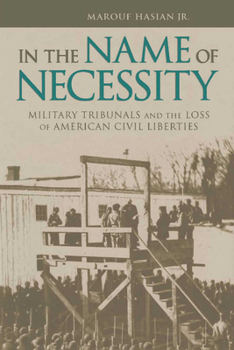In the Name of Necessity: Military Tribunals and the Loss of American Civil Liberties
Select Format
Select Condition 
Book Overview
Analyses the ways American leaders have justified the use of military tribunals, the suspension of due process, and the elimination of habeas corpus
Though the war on terrorism is said to have generated unprecedented military situations, arguments for the Patriot Act and military tribunals following 9/11 resemble many historical claims for restricting civil liberties, more often than not in the name of necessity. Marouf Hasian Jr. examines the major legal cases that show how various generations have represented the need for military tribunals, and how officials historically have applied the term "necessity." George Washington cited the necessity of martial discipline in executing the British operative Major Andr?. Tribunals tried and convicted more than 200 Sioux warriors during the Dakota Wars. President Lincoln suspended habeas corpus for many civilian and military prisoners during the Civil War. Twentieth Century military and civilian leaders selectively drafted their own codes, leading to the execution of German saboteurs during World War II. Further, General MacArthur's tribunal to investigate the wartime activities of Japanese General Yamashita raised the specter of "victor's justice," anticipating the outcry that attended the Nuremberg trials.
In those cases as in current debates about the prosecution of terrorists, Hasian argues that the past is often cited selectively, neglecting historical contexts and the controversies these cases engendered.
Though the war on terrorism is said to have generated unprecedented military situations, arguments for the Patriot Act and military tribunals following 9/11 resemble many historical claims for restricting civil liberties, more often than not in the name of necessity. Marouf Hasian Jr. examines the major legal cases that show how various generations have represented the need for military tribunals, and how officials historically have applied the term "necessity." George Washington cited the necessity of martial discipline in executing the British operative Major Andr?. Tribunals tried and convicted more than 200 Sioux warriors during the Dakota Wars. President Lincoln suspended habeas corpus for many civilian and military prisoners during the Civil War. Twentieth Century military and civilian leaders selectively drafted their own codes, leading to the execution of German saboteurs during World War II. Further, General MacArthur's tribunal to investigate the wartime activities of Japanese General Yamashita raised the specter of "victor's justice," anticipating the outcry that attended the Nuremberg trials.
In those cases as in current debates about the prosecution of terrorists, Hasian argues that the past is often cited selectively, neglecting historical contexts and the controversies these cases engendered.
Format:Paperback
Language:English
ISBN:0817357386
ISBN13:9780817357382
Release Date:November 2012
Publisher:University Alabama Press
Length:328 Pages
Weight:1.05 lbs.
Dimensions:1.0" x 6.0" x 8.9"
Customer Reviews
0 rating





